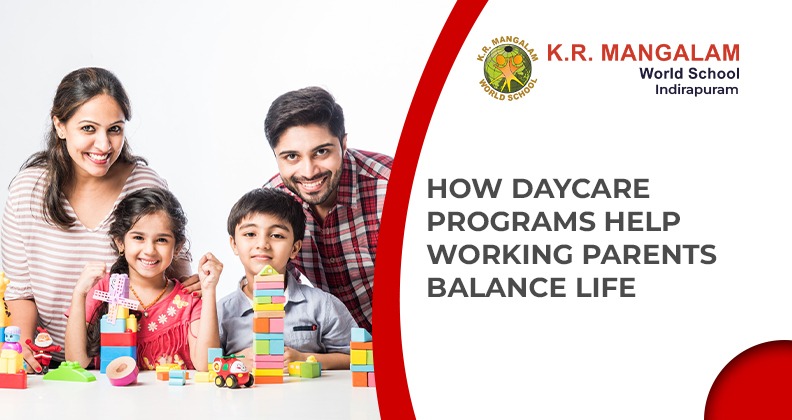Introduction:
In today’s fast-paced world, working parents often face the challenge of managing their professional responsibilities while ensuring their children receive the best care and attention. At K.R. Mangalam Indirapuram, the daycare in indirapuram ghaziabad where one solution that has become increasingly popular is enrolling children in a trusted daycare. Daycare programs not only provide a safe environment for children but also offer structured routines, early learning opportunities, and socialization that foster growth and development.
This comprehensive guide explores how daycare programs play a crucial role in helping parents balance their work-life commitments while supporting the overall well-being of their little ones.
About Us:
In our nurturing early-care programme, children enjoy structured routines infused with learning, play, and social interaction—giving working parents peace of mind and invaluable support. Designed with pastoral care, PSPE (physical, social, emotional learning), and experiential play, each day engages little ones through interactive activities, rhythm-based learning, and mini story-labs. Our caring team ensures safety—with secure entry systems and warm supervision—while introducing toddlers to gentle movement sessions, sensory games, craft activities, and child-friendly music corners. Weekly parent–teacher connections, short-day mini-events, and milestone celebrations keep families connected to their child’s growth. This nurturing bridge between home and school gives parents the reassurance of a caring, stimulating environment where young children are safe, happy, and engaged while they balance life and career.
1. The Growing Need for Quality Daycare Programs
The modern family dynamic has shifted significantly over the past few decades. Dual-income households have become common, and the demand for reliable child care solutions has increased. Parents seek programs that offer:
- Safety and security while they are at work.
- Early education opportunities to prepare children for formal schooling.
- Social interaction to enhance communication and emotional development.
- Flexible timings that align with varying work schedules.
A dependable daycare acts as an extended support system, bridging the gap between home and work life.
2. Benefits of Daycare Programs for Working Parents
-
Peace of Mind : One of the most significant advantages for parents is knowing their child is in a nurturing environment. This reduces stress and allows them to focus better at work.
- Structured Routine : Daycare programs follow a well-defined schedule that includes playtime, learning sessions, meals, and rest periods. This routine helps children develop discipline and time management skills from an early age.
- Professional Supervision : Qualified caregivers and trained staff ensure that children receive age-appropriate care, emotional support, and early education.
- Early Socialization : Children interact with peers, learn to share, take turns, and build foundational social skills crucial for future relationships.
3. How Daycare Programs Support Child Development
Daycare centers are no longer just places where children spend time while parents work. They are designed to support various aspects of development:
- Cognitive Development: Through puzzles, storytelling, and interactive learning.
- Physical Growth: Activities like outdoor play, dance, and exercise help improve motor skills.
- Language Skills: Daily interactions enhance vocabulary and communication abilities.
- Emotional Well-being: Consistent caregiver support fosters security and self-confidence.
4. Flexibility That Fits Modern Work Lifestyles
Many daycare programs offer extended hours or customized schedules to accommodate the needs of working parents. This flexibility ensures:
- Late pick-up options for those with long commutes.
- Holiday care services during school breaks.
- Part-time or full-day programs depending on work demands.
Such adaptability makes it easier for parents to manage unpredictable work hours without compromising their child’s care.
5. The Role of Early Education in Daycare
High-quality daycare programs integrate early childhood education to prepare children for kindergarten and beyond. Features include:
- Play-based curriculum that combines fun with foundational learning.
- Introduction to numbers, alphabets, and colors in an engaging manner.
- Creative activities like art, music, and storytelling to spark imagination.
This ensures that children are not only cared for but are also learning during their formative years.
6. How Daycare Programs Relieve Parental Guilt
Working parents often struggle with guilt about leaving their children in someone else’s care. Daycare programs help alleviate this by:
- Providing transparent communication about daily activities and progress.
- Allowing parents to stay updated through apps, photos, or regular reports.
- Offering opportunities for parental involvement through events and workshops.
This sense of partnership helps parents feel more connected to their child’s daily experiences.
7. Importance of Qualified Caregivers
The success of any daycare program depends largely on its staff. Trained caregivers:
- Understand child psychology and development.
- Maintain a safe and stimulating environment.
- Provide emotional support and personalized attention.
- Foster a nurturing atmosphere where children feel valued.
Parents should look for programs where staff are certified and undergo continuous professional development.
8. Safety and Hygiene Standards in Daycare
For parents, safety is non-negotiable. Leading programs prioritize:
- Secure entry and exit systems to prevent unauthorized access.
- Childproofed environments to minimize risks.
- Regular sanitization of classrooms, toys, and common areas.
- Emergency preparedness plans for unforeseen situations.
Such measures give parents confidence that their children are in safe hands.
9. Building a Strong Foundation for Future Learning
Daycare is often a child’s first step into a structured environment. It lays the groundwork for:
- Independence and self-help skills like tidying up or putting on shoes.
- Curiosity and love for learning through exploration-based activities.
- Emotional resilience by gradually adapting to new settings away from home.
These early lessons make the transition to formal schooling smoother and more enjoyable.
10. Emotional Benefits for Children
Attending daycare helps children:
- Develop a sense of routine and predictability.
- Build friendships and learn cooperation.
- Express emotions through play and guided interaction.
- Gain confidence in interacting with adults outside the family.
Such emotional maturity becomes a valuable asset as they grow.
11. Support for Working Mothers and Fathers
Balancing a career with parenting responsibilities is challenging, especially for new mothers returning to work or fathers managing demanding schedules. Daycare programs provide:
- Reliable care options that reduce career interruptions.
- Time for personal well-being, reducing burnout.
- Consistent support systems that align with evolving family needs.
This balance ultimately leads to healthier family dynamics.
12. Technology Integration in Daycare Programs
Modern daycare programs leverage technology to enhance communication and safety:
- Mobile apps for attendance, updates, and direct messaging.
- Live CCTV streaming for parental reassurance.
- Digital portfolios that track a child’s milestones and progress.
Technology bridges the gap between parents and caregivers, ensuring transparency.
13. How to Choose the Right Daycare
When selecting a daycare, parents should consider:
- Staff-to-child ratio for personalized attention.
- Curriculum design that balances care with learning.
- Clean, well-maintained facilities.
- Reviews or testimonials from other parents.
- Open communication channels with caregivers.
Visiting the facility and observing interactions can provide valuable insights.
14. Addressing Common Concerns About Daycare
-
Concern: Will my child struggle to adapt? : Most children adjust well when introduced gradually, starting with shorter hours.
- Concern: Does daycare replace parental care? : No, it complements parenting by providing structured care during working hours.
- Concern: Is it safe during health outbreaks? : Quality programs follow strict health guidelines, including vaccination policies and hygiene checks.
15. The Future of Daycare Programs
As the needs of working parents evolve, daycare programs are incorporating:
- Flexible hybrid care models (on-site and at-home support).
- Focus on emotional intelligence and mindfulness in early education.
- Sustainability practices such as eco-friendly materials and green play areas.
Parents choosing forward-thinking programs ensure their children benefit from modern and holistic care approaches.
Conclusion:
A well-structured daycare is more than a convenience—it is a partner in parenting. By offering a safe, stimulating, and nurturing environment, daycare programs help working parents balance their professional aspirations with their responsibilities at home. At K.R. Mangalam Indirapuram, the best preschool in indirapuram where children benefit from early education, social interaction, and emotional growth, while parents gain the peace of mind and flexibility they need to thrive.
When chosen wisely, daycare is not just a solution; it’s an investment in the family’s well-being and the child’s future.
FAQs:
Q. 1 What makes a daycare program beneficial for working parents?
Ans : Daycare programs provide safe, structured care with learning opportunities, allowing parents to focus on work without compromising their child’s development.
Q. 2 Do daycare programs include educational activities?
Ans : Yes, many combine play, story sessions, music, and motor skill activities to promote early learning.
Q. 3 How do schools ensure the safety of children in daycare?
Ans : They maintain CCTV surveillance, secure entry systems, and trained staff to ensure a nurturing and safe environment.
Q. 4 Are meals and rest times included in daycare schedules?
Ans : Most programs offer nutritious meals, nap times, and play sessions to maintain a balanced routine.
Q. 5 Can daycare help children develop social skills?
Ans : Yes, group interactions encourage sharing, communication, and emotional bonding among peers.
Q. 6 How are parents kept updated about their child’s day?
Ans : Schools use daily reports, mobile apps, and regular feedback sessions to keep parents informed.















